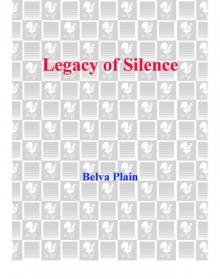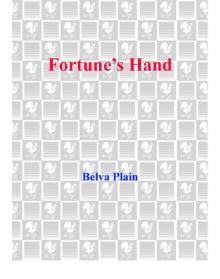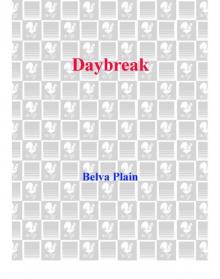- Home
- Belva Plain
The Carousel
The Carousel Read online
A Dell Book
Published by
Dell Publishing
a division of
Random House, Inc.
1540 Broadway
New York, New York 10036
Copyright © 1995 by Bar-Nan Creations, Inc.
All rights reserved. No part of this book may be reproduced or transmitted in any form or by any means, electronic or mechanical, including photocopying, recording, or by any information storage and retrieval system, without the written permission of the Publisher, except where permitted by law. For information address: Delacorte Press, New York, New York.
The trademark Dell® is registered in the U.S. Patent and Trademark Office.
eISBN: 978-0-307-78945-7
Reprinted by arrangement with Delacorte Press
Published simultaneously in Canada
v3.1
On a table in the center of the upstairs sitting room stood the carousel. High as a wedding cake, and of purest silver, it drew to itself every ray of the lamplight, returning each, magnified and glittering, to the dimmest corners of the room. It was a paragon of the silversmith’s art. The horses pranced; the children riding wore ribboned hats; pennants above the rooftop balustrade appeared to fly as though a wind were moving through; all was fretwork, filigree, and rococo.
Absurd, extravagant toy. Yet it had linked the momentous events of a life. The birth of love. Grief. And now, murder …
Contents
Cover
Title Page
Copyright
Chapter One
Chapter Two
Chapter Three
Chapter Four
Chapter Five
Chapter Six
Chapter Seven
Chapter Eight
Chapter Nine
Chapter Ten
Chapter Eleven
Chapter Twelve
Chapter Thirteen
Chapter Fourteen
Chapter Fifteen
Chapter Sixteen
Chapter Seventeen
Chapter Eighteen
Chapter Nineteen
Chapter Twenty
Preview of Promises
About the Author
Chapter One
March 1990
She was not ready to go home, and not ready to face anybody, neither the five-year-old nor the infant, not prepared to answer the telephone or speak a civil word, after what had just happened during this past hour. Never had Sally Grey felt so wretched, so small, as if she had physically shrunk, as she sat huddled behind the wheel of the car and fled the city.
On the first plateau in the chain of mountains that stretched toward Canada, a scenic overlook had been set aside, very likely for the benefit of tourists. On this waning, windy afternoon it was deserted, and here she stopped the car. Below lay Scythia, an old city, its small factories ringed by tracts of new-built bungalows and highways; beyond them to the east, west, and south came farms. In the north, the dark mountains.
Lights winked on in scattered spots, but to Sally’s left, where lay the headquarters of Grey’s Foods, light was a solid yellow oblong, marking the place to which one quarter of the city’s population was in some way connected, either employed by the company or related to someone who was. As to that, the other three quarters of Scythia had been touched in some way by the Grey family’s generosity: the library, the hospital, the neighborhood swimming pools, all were gifts from the Greys.
“You’re thinking such things don’t happen in families like yours. I understand,” that woman, that doctor, had said.
No, Sally had thought, you don’t understand. You thought I was feeling some sort of superiority, above the flaws of the common people, that I was feeling some sort of nasty, idiotic snobbishness. But I was thinking only of how happy we have been, of how pure our life has been. Pure. Such a Victorian word! But all the same, it fitted. There had been nothing dirty in their lives until now.
Somewhere within that compact mass of light, at this very moment Dan was working at his desk, not knowing. Tonight he would have to know. And if it should be true—no, of course it cannot be true, of course not—it would devastate him. His baby! His darling Tina.
No, there’s no doubt in my mind. Your Tina has been molested. Sexually abused.
Dr. Lisle had already explained herself at length, but still Sally had simply stared at her. She had a homely, square face and a cool manner, this woman who, although no older than Sally, was dressed in authority, buttressed by professional knowledge.
Scolding me, that’s how she sounds, as if I were a schoolgirl instead of a woman who has had her own experiences, has traveled all over the world in peace and war with her cameras, having her photographs published all over the world. Well, I guess the truth is we simply don’t like each other. What kind of a crazy thing is this to tell me?
And as if looking for help, she stared about the spare, plain office. Its inexpensive desk and chairs were new. Its diplomas and certificates were recent. The view led over the back of a run-down three-story commercial building in the run-down heart of town. It was an uncomfortable, dispiriting place with no help in it. But the doctor had been so well recommended!
“This is incredible,” Sally said abruptly.
“No, it’s credible.”
“I can’t believe you. I won’t believe you. How can you even think of such a thing?”
“It’s natural for you to resist. What parent would want to believe it?”
“It’s incredible.”
“It’s credible, Mrs. Grey.”
“I live with Tina! I bathe her, and I’ve never seen a sign of—”
“There doesn’t have to be penetration. There are other ways, as you know.”
Revolting images flared. She had almost felt them burning, pressing inside her skull.
“Yes, I know. I read. But how can you be so sure? Has Tina told you anything?”
“Not directly, in so many words. Children rarely do. They’re too afraid.”
“Well, then, I ask you, how do you know?”
“There are many ways. For example, they play with dolls. Mine here are anatomically correct. I watch the child, I talk to her, and I listen while she talks to herself.”
“Tell me what Tina says. Exactly what you remember.”
The doctor put on her reading glasses. How long it took for her to fumble in the case and adjust them on her nose! It was a torture to watch.
And now, in the car, remembering, reliving, Sally’s head began to pound.
“Here. Friday the tenth, the visit before last. I quote: ‘You take your panties off, then you put that thing—’ ”
“Oh, no!”
“ ‘And you put your mouth—’ ”
“Oh, no!”
“Then she took the doll and threw it across the room, and she cried. Are you feeling all right, Mrs. Grey? I can stop if you wish.”
“All right, stop. I have the picture.”
It was then that there had come the onset of terror, a quick, slashing pain in the chest and wet hands, twisting themselves together until the ring dug into the flesh. It was then, too, that she had straightened her back and sat up. For if you panic, Sally, you drown.
She said positively, “Tina is never left with strangers. She’s very well supervised, by me when I’m home and by a marvelous nanny, a sweet, grandmotherly lady who helps take care of Susannah, the baby, and takes charge of everything when I go away on business. I’m a photographer, you remember. But I never stay away for more than a few days at a time. No, it can’t be, Doctor. It’s—it’s bizarre. Your diagnosis has to be mistaken.”
“Tell me, then, how for example you explain Tina’s talk to the doll?”
“Well, children of that age are just starting to discover thi
ngs, aren’t they? And I’m sure there are children in school who have older siblings who’ve told them about sex. God knows there’s enough of it on television. We don’t let Tina watch much television, but many other people do, and it filters down to the rest of the kids.”
The doctor waited. She had been trained to observe, to listen for what people did not say. Sally knew that, and she sat up even higher in the chair.
“How have things gone this past week?” the doctor asked.
Yes, Sally thought, let’s get back to reality, let me give you some plain facts and then you tell me how to deal with them, if you can. Fact, not fantasies.
And she said honestly, “The same. On and off. Sometimes the average five-year-old and sometimes not.”
“Tell me about the ‘sometimes not.’ ”
“Well, at school, I’m told, she’s still doing some hitting and biting. At home, we’ve had some temper tantrums. And her bed is still wet every night. She still asks me when we’re going to take Susannah back to the hospital. No matter how carefully I explain, she keeps asking. To my mind, Doctor, that’s the source of the whole trouble.”
“As easy as that? What I’ve told you makes no impression on you?”
“I’m with Tina all the time, I’m her mother! She plays with dolls at home, so wouldn’t I have observed something strange too? Surely, she would have told me if someone had—done anything to her.”
“I’ve explained to you, not necessarily. In fact, most probably she would not. A child can, in a vague way, feel guilt. She knows that something is wrong, although she can’t explain it. And she may be afraid to betray the person who abused her. She may even in some way, in some fashion, have liked the person. It’s not all that simple, Mrs. Grey.”
Sally was silent. And the doctor, with a sudden surprising change of manner, said gently, “You should really, very seriously, consider what I’ve told you. I can read you much more from my record if you need to be convinced.”
Sally put up her hand. “No. Please, no.”
“You’re afraid, Mrs. Grey.”
“Dr. Lisle, please believe me, I respect your knowledge, but mistakes—even you, excuse me, even you, anyone can make one—and in this particular case, you’re wrong. The way we live, this is impossible.”
“People always think it is unless they see something with their own eyes.”
“Everything was fine before the baby came. We had no problems at home, none at all. Maybe you think I’m exaggerating when I say that Dan and I have had a charmed life. I suppose some people say things like that to cover up the truth. But that would be foolish. Why should I come here for help and then lie to you? We have a good home, believe me. I wish every child in the world could have a home like ours, and a father like Dan. Sundays we cook together, Dan’s proud of my work, we love each other. It’s been such a happy house, and surely Tina must have felt the happiness. Everyone said she was such a sunny child—”
She had prattled. Now, alone in the car recollecting, she was certain she must have seemed foolish. But she had almost gone out of control. That resolute, stiff posture of hers had been a sham.
A solemn gaze had been turned to her while she prattled. It had been uncomfortable to confront that gaze, but to avoid it had been awkward, too, so she had alternated between the gaze and the dingy warehouse across the street. Her voice had petered out and still no comment had come. I have to get out of here, she had thought. Tomorrow we’ll find another doctor. This woman, well recommended or not, was like a surgeon, an alarmist who gives you only a month to live unless you undergo an immediate operation. It was outrageous.
“What I decided,” she had resumed, “what’s clear to me now is that I have to refuse any new commissions for a while. Or until Tina is back to normal. Yes, that’s what I’ll do. Basically, Tina is fine, I’m sure.”
“With all those symptoms you say she’s ‘fine’? The hitting and biting and all the things you’ve told me before, that she won’t allow you to hug her, that she’s afraid to let you leave the house—”
“I meant—well, she’s certainly not fine, of course not. That’s why we brought her here. I feel that she needs more of my attention until she gets over the baby, and I definitely intend to—”
“You’re making a big mistake, Mrs. Grey.”
Sounding doom. And all of this doom was based on slim evidence, supposition, textbook theory. So Sally had stood up and put on her coat.
“Tell me, then,” she said concisely, “what you advise me to do.”
“I advise that you keep Tina here in treatment, or, if you’re not comfortable with me, with somebody else. And I certainly advise that you start looking very carefully into the circumstances of her life. The child has been abused, Mrs. Grey.”
It was cold in the car with the motor shut off, and she drew her scarf tightly around her neck, crossing her arms.
Abused. How horrible.
But could it be true? Then who could have done such a thing? Some father in a house where Tina went to play? She went over the list, the possible contacts. That retarded man on the country road near her parents’ house a few months ago? Of course not. The grandmother was fanatically careful. No. It wasn’t true. It wasn’t possible.
That doctor had been so positive. Could a doctor make such an egregious mistake? Of course she could. You read the papers. Still, it’s not a thing that happens every day.
She must pull herself together and go home. Thousands of lights, electric polka dots in the looming night, had come on in the city below. It was late. She turned the key in the ignition and headed the car uphill.
On either side the road was sheltered between old stands of spruce and hemlock. Gaps in these natural walls revealed stone gateposts, long driveways, and, rarely, the glimpse of a handsome house. At a bend of the road on the left stood the imposing gates of Hawthorne, the Greys’ huge, formal family seat. Here Dan, aged seven, had gone to live with his relatives after the air crash in which his parents had died. Behind the house, hidden a quarter of a mile away from sight, there began the wilderness, the eight thousand acres, pristine and precious, that belonged to the Greys but, by their willing consent, was open to all, provided that they would do it no harm, would cut down no tree or wound no animal. So it had been, for how many generations Sally did not remember, but so it was still. An extraordinary family, the Greys.
In a grassy clearing some few miles farther on, a square white house with green shutters and the austere simplicity of New England was home to Sally. She always thought, and thought now as she drove into the garage, that it could hardly be more different from Hawthorne or any other Grey family home. But she was a child of Maine, and Dan was not a typical Grey, so this was what they had both wanted. The dog, a lumbering Newfoundland, was sitting on the front step. His presence there made the scene almost hackneyed: the picturebook house and the family dog, she thought ironically, lacked only a child to sit beside him with her arm around him.
Actually, Tina sometimes did just that. The dog was the only “person” she would hug. The enchanting little girl with the ruffles and ribbon braids was hardly ever pleasant or affectionate anymore. Outings that they all used to look forward to were now undertaken with trepidation since they were never sure how she would behave. At night, when at last she was asleep, they could quietly read and could quietly talk to each other … although not in peace. For what had happened to the picturebook family? What was wrong with the once enchanting little girl?
Is it possible that I don’t want to believe that doctor because we didn’t take to each other, because “the chemistry wasn’t right”? A stupid reason, if so. I don’t know.…
Tina was finishing her supper in the kitchen with Mrs. Dugan, known by all as “Nanny.”
“Hello, darling. My, that pudding looks delicious.”
Tina frowned. “It isn’t. You eat it.”
“I wish I could. But Daddy and I are going out to dinner. It’s Uncle Oliver’s birthday.”
“You’re always going out.”
“No, honey. We haven’t been out all week,” Sally said, putting her arm around Tina and kissing the top of her head.
“Don’t do that. I don’t want you to hug me.”
Nanny’s puzzled gaze met Sally’s distressed one.
“But why? Mommies like to hug their little girls.”
“I don’t care. When are you going to take Susannah back to the hospital?” Never a day passed without at least one such petulant demand.
“I told you, we don’t take babies back,” Sally whispered gently. “We didn’t take you back. We love our babies.”
“I don’t love her. She’s not my baby. I want you to take her back tomorrow.”
“Here’s Mr. Grey now,” said Nanny, who had been standing near the window.
“Good heavens, and I’m not dressed yet. I’ve got to run up and change my dress, Tina.”
“Take her back tomorrow,” Tina wailed, “with her crib and her blanket and all her toys.”
You weren’t supposed to lie or evade, and Sally rarely did, but this day was different. Her energy was spent, and she fled upstairs, leaving Nanny to cope with Tina. That’s what the trouble is, she told herself yet again. That’s all it is, simply jealousy, plain as can be. What more proof could you want? It’s just exaggerated in Tina because she’s a sensitive child. In time, with help, it will die away.
Yet that stern-eyed woman had been so sure.
Chapter Two
March 1990
“Yes, yes,” said Oliver Grey from his armchair at the head of the table. “I remember very well when my father had that bow window built on. I was about five years old, so it must have been in 1932. Or thereabouts,” he added precisely. “My grandfather thought it was a sacrilege. He would have kept everything unchanged from the time his own father lived here. He would have kept the horse cars in town, too, and the gaslights, if he could have. He was what they call a ‘character.’ ”

 The Golden Cup
The Golden Cup Her Father's House
Her Father's House Whispers
Whispers Crescent City
Crescent City Legacy of Silence
Legacy of Silence Crossroads
Crossroads Promises
Promises After the Fire
After the Fire Tapestry
Tapestry Looking Back
Looking Back Heartwood
Heartwood The Carousel
The Carousel Fortune's Hand
Fortune's Hand Homecoming
Homecoming Random Winds
Random Winds Harvest
Harvest Evergreen
Evergreen Treasures
Treasures The Sight of the Stars
The Sight of the Stars Secrecy
Secrecy Daybreak
Daybreak Eden Burning
Eden Burning